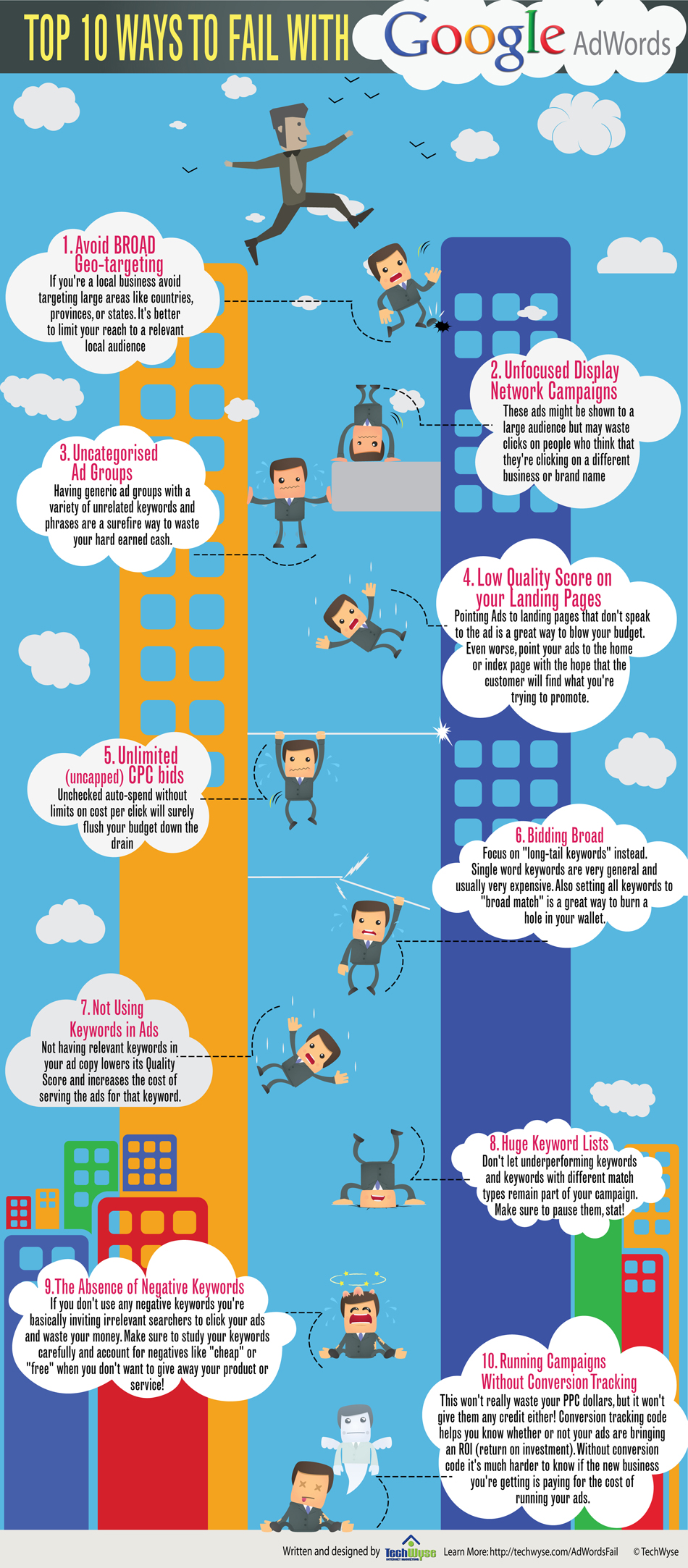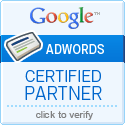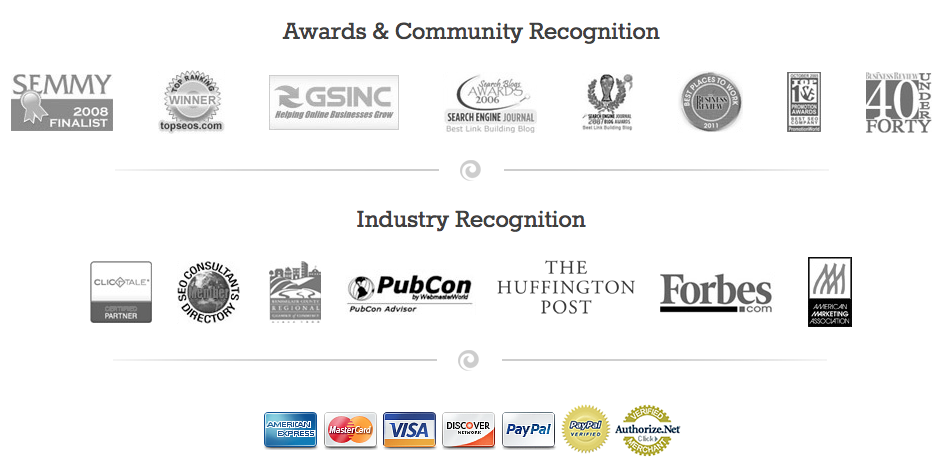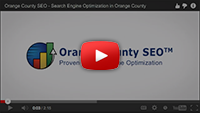Orange County SEO™ Blog
Your Path To Better Landing Page Optimization
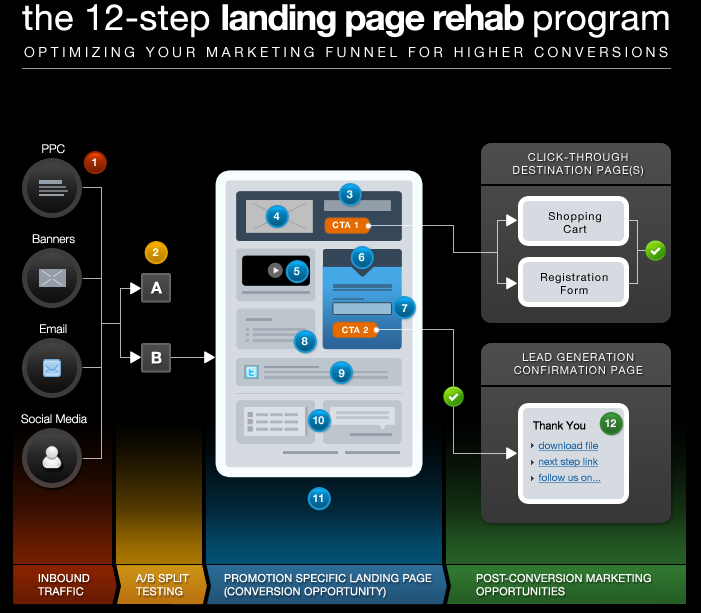
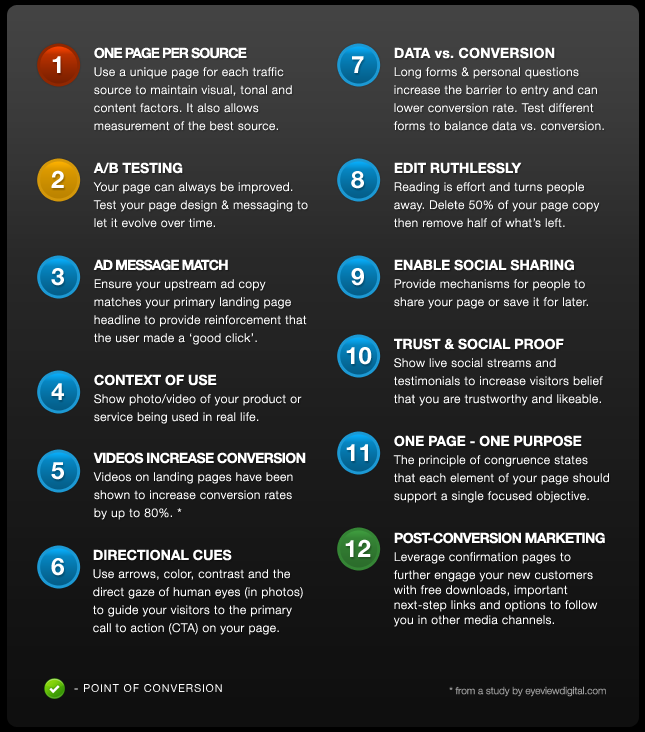
Landing pages are what your visitors see when they visit your site. They are your ambassadors to the public and as such should be at their very best. Good landing pages draw customers in, while bad ones can send them running.
There are many components to a good landing page, and combining information about landing pages into infographics makes it easier to understand the components at a glance.
Here are the 12 important points from this infographic:
- Use only one page per source. Mixing too much information makes a landing page “busy” and throws potential customers off.
- Use A/B testing. Do not assume your page works well; test it for yourself.
- Be sure your ad message matches your ad. Nothing is more frustrating for customers than to land on a page that has little or nothing to do with the link they clicked.
- Consider context of use. Rather than static images, upload videos or pictures of your product in use.
- Use videos to increase conversion. People tend to trust videos of the product more because they can actually see it being used.
- Use directional cues. Point to your call to action with visual cues such as arrows or other symbols.
- Consider the balance of data vs. conversion. The longer and more personal your data entry forms, the more customers drop out. Do you really need all that information or is there a better way to obtain it? One way to avoid the red-tape syndrome is to get information in stages as customers perform more intensive activities. Casual visitors can fill out one form while buyers fill out additional information.
- Edit ruthlessly. Do not be afraid to tear out worthless or non-working parts of your page and replace them with better content. If you are unsure about your content, consult an expert for copywriting assistance.
- Enable social sharing. Putting up Facebook pages, Pinterest boards, LinkedIn profiles, and Twitter buttons give you instant–and free–advertising. Social media is quickly becoming a huge marketing strategy so take advantage of these platforms and their ability to reach millions of potential customers.
- Create trust with social proof. People believe testimonials from other satisfied customers.
- Remember that one page has one purpose. If you need another page for a different aspect of your product or a different product altogether, create it–do not try to cram too much into one page. This helps keep visitors focused on the end goal—conversion.
- Do not forget post-conversion marketing. Invite clients to join you on Facebook, tell their friends for a discount, and offer other post-conversion opportunities. This is key to generating return visits and building brand loyalty.
The experts at Orange County SEO can help you optimize your landing pages to give you the best possible results for your business’s website. Contact Orange County SEO today to find out how we can help you build great landing pages to promote your business and turn your browsers into paying customers.
Google Adwords & Your Business Infographic
How to advertise with Google AdWords
Google will take you through all the steps of registering for AdWords, cost, and how to use AdWords. A live representative can even help you over the phone if you are unfamiliar with the way AdWords works.
What is Google AdWords Auction?
Not all clicks are the same. Some are worth more than others because there is a great deal of competition for these particular terms. Google uses an auction format to determine how much each keyword is worth.
How many times does a Google auction run?
Google conducts auctions on an almost continual basis. You can talk to Google about the price of certain advertising; the more popular it is, the higher the cost will be.
How does a Google auction work?
When someone makes a query on Google, the company runs the auction that determines the ad’s position in the search rankings and the cost for the ad.
How do you enter a Google auction?
You must meet a bid requirement based on your keyword in order to enter an auction.
How can advertisers bid on Google auction?
Businesses bid in an auction based on the keyword’s ad positioning. The higher the position of the keyword in searches, the better it performs in an auction and the more it will cost.
What gets entered into a Google auction?
Businesses specify the price they are willing to pay for a keyword which is then entered into the auction.
What is average cost per click?
The average cost per click is the amount you spend whenever someone clicks on your ad.
What is CPC?
CPC is short for “cost per click” and indicates the amount it costs the advertiser when someone clicks on the keyword.
How does CPC work?
For Google’s pay per click, an upfront cost-per-click is generated that rises if the number of clicks exceeds the maximum allowed at that price.
What is a CPC bid?
A CPC bid is one that negotiates with Google to get you the maximum number of clicks for your budget.
How does CPC bidding work?
Bidding is based on the ad’s rank and the maximum bid you specify.
What is a CPC bid limit on Google AdWords?
Technically there is no bid limit but in reality your limit is imposed by your budget and the value of your keywords.
How many times can you bid on Google auctions?
You can only bid once on each keyword per auction.
How does CPC advertising work?
CPC allows companies to pay only for the number of times their ads are accessed by users, as opposed to “flat fee” advertising.
What is a Google auction quality score?
Google calculates your page’s quality score based on relevance and other factors. This score measures how useful your ad is to users searching for that type of web page.
How does Google determine what you pay?
Your ultimate advertising price is determined by the number of clicks you receive.
What is Google ad rank?
Your ad rank is the position your ad occupies in the search engine.
Ad rank vs. Quality score
While ad rank measures how successful your web page is in terms of its position on the search page, quality score reflects your overall website quality to users.
Quality score vs. CPC
Just because you have many clicks does not mean you will have a high quality score. Your quality score is based on the quality of your site, not how many people visit it or the cost of your advertising.
What is ad position in AdWords?
Ad position is where your ad ranks on the search engines.
How to check Google ad ranking
Google Analytics is the best way to measure your ad’s ranking.
CPC vs. Actual CPC
Google calculates actual CPC which may be more or less than your original CPC which is an estimate.
What is Actual CPC?
This number is the actual price paid per click by the business that is advertising.
How does AdWords calculate Actual CPC
AdWords calculates actual CPC by dividing the ad rank of the next-lowest advertiser by the quality rank and adding $.01.
What is Google’s display network?
Google uses three aspects in its search engine display: geo-specific results, sponsored advertisers, and search engine results.
What ads are on a Google display network?
Sponsored ads have been paid for by owners or donated by Google.
What are alternative bidding methods?
Alternative bidding methods for an AdWords auction are CPM and CPA.
What is CPM bidding?
CPM means “cost per impression.” CPM bidding can be used along with CPC bidding.
CPC vs. CPM
Both methods can be used simultaneously.
What is cost-per-acquisition bidding?
CPA bases its cost on how many searchers actually purchase.
How does CPA work?
This advertising is calculated by the user’s actions after entering the website.
How does CPA marketing work?
CPA markets to more specific target groups that are more likely to purchase or subscribe to a website.
CPC vs. CPA
Google determines your CPC bids based on historical conversion data. If you use a conversion optimizer and bid on a CPA, that is how your rate will be calculated.
CPM vs. CPA
Both CPM and CPA are based on user activity, but CPA is more specific in that it follows the user through to purchase or subscription.
What are keywords?
Keywords are single words or phrases that target specific search groups.
How do keywords work?
Keyword advertising tries to anticipate exactly what a user will type into a search engine to find what he or she is looking for you. General keywords therefore return many hits, while specific keywords are more limited. For example, “dictionary” is far less specific than “Merriam and Webster’s 3rd edition.”
How does a keyword search work?
Algorithms determine the most relevant results for keyword searches and display them for the user.
How does Google determine search results?
Google uses keywords in web pages as well as CPC and ad rank to determine search results.
How to get your Google ranking up?
To increase your search engine ranking you must have search-engine friendly advertising. The best way to ensure that your advertising complies with the current algorithms used by Google is to engage in search engine optimization.
What is search engine optimization?
Search engine optimization, or SEO, is how you improve your web sites ranking through natural or organic searches. It is done by attention keywords and content.
How does SEO work?
SEO experts continually update relevant keywords to keep web pages optimized on search engine pages.
Google display network vs. Google auction?
While Google display network is generated automatically, Google auction is triggered by placements on Google AdSense. This is where publishers offer advertising space.
What is an ad group in Google AdWords?
Your Google AdWords account is organized to include specific items and is known as an ad group.
How do ad groups work?
An ad group contains a small number of ads, keywords, placements, and other marketing products. It helps if merchants create different ad groups for each product.
What is ad relevance in AdWords?
Ad relevance measures how well-related your keyword is to your advertisements to avoid “packing” ads with irrelevant keywords.
What is a conversion optimizer in AdWords?
This feature helps guarantee that your ads are optimized to appear in situations that are likely to result in conversions or purchases.
How does a conversion optimizer work?
The conversion optimizer uses algorithms to determine how many of your customers are “following through” and targets your advertising to those parameters.
How does conversion optimizer determine CPC?
A conversion optimizer automatically determines the highest CPC bid. This information is gathered from your ad’s history and used to determine your most relevant and valuable ad strategies.
The tips and definitions in this infographic will help you get the most out of your CPA, CPM, and CPA ad campaigns.
10 Easy Mistakes That Will Make You Fail with Google Adwords
To add the above image to your website, please copy and paste the code below.
Pay per click advertising is confusing for most small business owners. They know what they want: an easy and economical way to advertise their businesses on the Internet. Still, the thought of paying for AdWords for people who are “just browsing” can be daunting. Here are some tips about how to make the most of your AdWords budget by avoiding common mistakes.
- Do not use broad geo-targeting. Instead, limit your geo-targeting to a local audience. You will find that people are often searching for local merchants, and you want your name at the top of the list.
- Avoid unfocused campaigns. It might seem like a good idea to be purposefully vague and target a large audience, but customers tend to become irritated when they click on a link only to find out it was not what they wanted.
- Do not use uncategorized groups. It is important to categorize your keywords. Otherwise, you are throwing them into a communal pool in which you cannot possibly compete.
- Avoid low quality scores. Your landing page should reflect exactly what your ad promises. Otherwise, you risk a low score and wasted advertising budget. You also risk customer disapproval or frustration at trying to find what they were looking for in the first place.
- Do not allow uncapped CPC bids. Never use auto-spend on pay-per-click or you could find your budget awash before you begin. Start small and build your advertising to a level that gives you good ROI.
- Avoid bidding broadly. Long-tail keywords are the key to success. Using fatheads not only burns your budget but puts you in competition with many others doing the same thing. Your business specializes in something, so your keywords should reflect that specialization.
- Be sure to include keyword in your ads. Some people try to avoid the issues surrounding keywords by deleting them from their ads, but this lowers your overall quality score and does not help promote your business.
- Avoid under-performing keywords. If your keywords are not working, try something else. It could be that you are simply missing the mark slightly with your audience. Refreshing your keywords could give you a bounce in your rankings and site visits.
- Do not avoid the use of negative keywords. There is a place for negative keywords, and it is in filtering your results so that you draw in serious customers. Words like “cheap” or “free” will invite a lot of non-buying clickers.
- Avoid running campaigns without using conversion tracking. You will never know if your ads are working if you do not track your conversion rate. Simply knowing how many people clicked is not enough. This is essentially the same as counting the number of people who come in a store without tracking actual purchases.
With a bit of work, you can tailor your PPC campaign for maximum value and ensure that your customers will buy things when they visit your site. Orange County SEO can help you maximize your PPC campaign. Give us a call to discover how.

